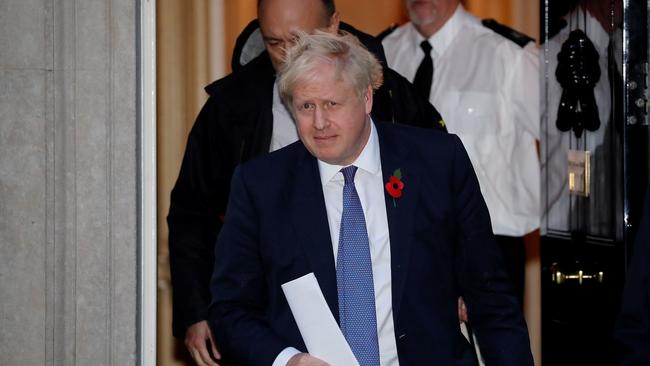Britain set for December poll after Corbyn changes strategy
Jeremy Corbyn has agreed to support a December general election after the prospect of ‘crashing out’ of the EU was taken off the table.

Labour leader Jeremy Corbyn has finally agreed to support a December general election after the prospect of “crashing out” of the EU was taken off the table.
The issue was due to be put to a vote in the House of Commons early on Wednesday (AEDT).
Mr Corbyn told his cabinet late on Tuesday: “I have consistently said that we are ready for an election and our support is subject to a no-deal Brexit being off the table.
“We have now heard from the EU that the extension of article 50 to 31 January has been confirmed, so for the next three months, our condition of taking no-deal off the table has now been met.
“We will now launch the most ambitious and radical campaign for real change our country has ever seen.”
Labour had been wrestling whether to keep a stranglehold on Boris Johnson’s minority government or try to break the Brexit deadlock by going to the polls.
It appeared that a compromise date of Wednesday December 11 was to be put to MPs for ratification. It would be Britain’s first December election since 1923.
When Mr Corbyn was asked about those of his MPs who doubt the wisdom of backing an election and fear it will play into Mr Johnson’s hands, Mr Corbyn said: “The Labour Party loves a debate — but they also love the end of the debate. And this is the end of the debate, and we’re going out there to win.”
The latest polls indicate the Conservative Party is 12 points ahead and the bookies have the party odds-on to win. but the country is so divided there is great uncertainty.
There has been fierce debate about the date, with students’ Christmas holidays a key factor.
Prime Minister Boris Johnson had earlier urged Westminster to “replace this dysfunctional parliament so the country can move on’’.
The opposition parties, particularly the revoke-Brexit campaigning Liberal Democrats, believe they will get a huge boost from students and want the earliest date of December 9. At that time students will still be at their campus addresses to vote. If they return home they will have to postal vote.
The Tory government wants the election held on December 12 because it allows time for the parliament to pass budget bills for Northern Ireland later this week before dissolving for the election.
Mr Johnson has clearly decided a snap election is preferable to trying to get the “do or die’’ Brexit Withdrawal Bill through a hostile parliament. MPs have signalled they would attach to it a confirmatory referendum or customs arrangements to it if it returns to the Commons.
Both the Lib Dems and Scottish National Party are also in favour of an election, believing their anti-Brexit positions will boost their numbers in a new parliament. But the Conservatives, while polling strongly, could have some support eroded by Nigel Farage’s Brexit Party, which has called for a hard and clean Brexit.
Any election will see an upturning of traditional two-party support and it will become a quasi Brexit referendum.
At this stage it appears Labour will muddle a campaign, arguing for a second referendum to try to keep its Leaver constituencies in the north on side but also pushing for Remain to avoid huge losses to the Lib Dems.
Those unresolved Brexit tensions have underpinned a reluctance by Labour leader Jeremy Corbyn’s to commit to the election. On Monday he cited concerns about “disenfranchisement’’ of young voters and the need to “protect the voting rights of all of our citizens”, even though many campuses don’t break up until much closer to Christmas.
Labour MPs have also trotted out excuses that people don’t want their Christmas preparations disrupted by an election campaign.
But Labour has been cornered, with the EU extending the Brexit deadline to January 31, allowing enough time for an election without threatening a no-deal Brexit.
Mr Johnson was to bring forward yet another attempt to have an early election after failing on Monday, for the third time, to get a two-thirds majority required to go to the polls on December 12.
The vote passed comfortably by 299 to 70 but failed to reach the two-thirds majority — 434 — required under the Fixed-Term Parliaments Act.
But by using a “nothwithstanding’’ bill that bypasses the Fixed-Term Parliaments Act, Mr Johnson would need only a simple majority to get his motion passed.
By introducing the bill, Mr Johnson has had to abandon any hopes of bringing forward the Brexit Withdrawal Bill in the coming days.
Ian Blackford, the SNP Westminster leader, said his party would need a “cast-iron guarantee” that Mr Johnson would not try to bring back his Brexit deal to parliament.
“It is clear that there is a desire on the opposition benches to bring forward a bill that can give us an election. But we don’t trust this Prime Minister and we don’t trust this Prime Minister for good reason,’’ he told MPs.




To join the conversation, please log in. Don't have an account? Register
Join the conversation, you are commenting as Logout